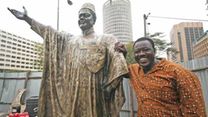Can African democracies protect the lives of the most vulnerable?
A syndrome is ‘a combination of medical symptoms that shows the existence of a particular disease or mental condition.’
Hans Joachim Schellnhuber, a German atmospheric physicist and climatologist, adopted the term syndromes to characterise the non-sustainable, endangering and risky behaviours in the interaction between nature and humanity. He called this ‘non-sustainable patterns’.
The position that this column has recently taken – that the socio-political and economic terrain we discuss is everything – has revealed a number of syndromes characteristic to the African region. An “absence of good governance” pandemic that is more virulent and certainly more long-lasting than Covid-19 – 50 years on with no known vaccine.
Corruption, state capture, extravagant expenditure, poor leadership and lack of respect for the rule of law are among the non-sustainable, endangering and risky patterns of behaviour endemic across Africa.
Caring for the common good, for our neighbours, and for the country is essential for sustainability, for the preservation of this generation and future generations. Care is built on empathy. Sadly, Covid-19 has laid bare not only our health sector’s lack of preparedness, but also our lack of empathy, our apathy.
The three Es – ethnicity, economy and empathy
Several years ago, we spoke of the three Es – ethnicity (E1), economy (E2) and empathy (E3) as indicators of the type of democracy we live in. They tell us how developed, mature and refined a democracy is.
Democracies rely heavily on identification. Identity connects people, it gives a sense of belonging. In plural or multicultural societies, democracy is a challenge unless it is strongly founded on freedom of expression and respect for minorities.
In E1 democracies, shared ethnicity determines voting trends. In every election cycle, casting your vote is in most cases a dilemma rather than a choice. This is common in traditionally rural and agricultural democracies. At this level, our man (it is usually our man and rarely our woman) guarantees our land and peaceful coexistence. Everything else is practically irrelevant.
For more developed societies (E2 type of democracies), money matters. Shared ethnicity is not enough, and people are guided by their pocket, by financial gains. This is usually resolved by comparing purchasing power before and after the election.
In E3 democracies, which are considered the most mature democracies, priorities shift towards ensuring that basic needs, social services and justice are accessible to everyone. Citizens in such democracies therefore vote for those with an interest as well as a track record in eliminating social, economic and political inequalities. Leaders focus on issues such as social inclusivity, sustainability, the environment and vulnerable groups in society. Nordic states are probably the best examples of empathetic (E3) states.
In E3 democracies, which are considered the most mature democracies, priorities shift towards ensuring that basic needs, social services and justice are accessible to everyone. Citizens in such democracies therefore vote for those with an interest as well as a track record in eliminating social, economic and political inequalities. Leaders focus on issues such as social inclusivity, sustainability, the environment and vulnerable groups in society. Nordic states are probably the best examples of empathetic (E3) states.
Executive power play
More than any other response, executive orders have been the favoured response to this crisis in Africa.
Diagram 1 – Breakdown of executive orders related to Covid-19 in African countries.
Diagram 1 – Breakdown of executive orders related to Covid-19 in African countries.
Data sourced from: International Centre for Not for Profit Law, COVID-19 Civic Freedom Tracker.
Whilst we should expect quick and agile responsiveness to a crisis, the absence of extensive parliamentary oversight or participation is both an example of executive over-reach and parliamentary lethargy.
Our Parliament, so far, has done little except for limited tax measures. It defeats common sense that our Parliament was able to pass a Referendum Bill before a Covid-19 Recovery Bill. It would be the equivalent to a man at the edge of a cliff and about to fall into the precipice, wondering about the weather or worse, a man being mugged at gun point, and asks the thieves with curiosity to show him the type of bullets they are using.
This is called pandemic backsliding. The Pandemic Backsliding Risk Index in the diagram below indicates the risk of declining democratic freedoms as a result of governments’ responses to the Covid-19 pandemic.
Diagram 2
Source: V-Dem Institute, Pandemic Backsliding: Does Covid-19 Put Democracy at Risk?
For the first time since 2001, 92 countries (54 per cent of the global population) are autocracies and about 35 per cent of the world’s population or 2.6 billion people live in autocratic nations.
Democracy at risk
Democracy at risk
To enforce curfews and stay-at-home orders globally, police, and in some instances military forces, have been deployed onto the streets of cities, towns and even villages. The levels of compliance in Kenya have been remarkable.
In Kenya, such measures are reminiscent of the 1982 full day curfews following an attempted military coup. Unfortunately, the same brutal force that was applied back then to quell armed movements is now being used to suppress a virus outbreak.
Some people have been killed by the police to prevent them from dying of Covid-19. Indeed, police brutality is commonplace in most African countries. It is impossible to justify such actions as proportionate to the threat posed by a virus.
An important reason why the V–Dem research can definitively state that some countries have declining democracies is because some of the new measures taken have an indefinite duration, seemingly granting executive officials permanent and vast powers.
This is alarming, given the fact that over a dozen African countries are supposed to conduct elections this year. With executive powers expanding, incumbency seems more and more likely. Whether this will spark the comeback of extended presidencies is yet to be seen.
Ignoring Inequality
In countries like Kenya, seven eighths of the capital city’s land space is owned and occupied by the middle to up market segment of the population. This leaves an eighth of the land to informal settlements, resulting in over-congestion, with no space for public utilities, as well as immense pressure on every square inch.
There has been little recognition of how social distancing works in informal settlements. The rules imposed have been designed and are applicable in middle case housing estates and in formal businesses. If Covid-19 does not spread widely in informal settlements it will not be because of the success of social distancing.
The very people in these informal settlements are the greatest casualties of the economic and health tragedy of Covid-19. Living on the edge of existence even before Covid-19, many are now reliant only on the goodwill of others.
So far the government’s economic response has barely focused on the misery of the marginalised and has not shown that it is prepared to do so, but has instead acted as if it has a plethora of choices. Businesses across Kenya are faced with hard choices of where to allocate scarce resources or how to raise capital. The government has made few difficult economic choices in the allocation of resources and has instead continued its orgy of borrowing.
The recently unveiled economic stimulus package allocates Sh600 million to promote local car assembly firms by buying locally manufactured vehicles for government. Additionally, Sh10 billion is to be spent on fast-tracking payment of outstanding VAT refunds and other pending payments to SMEs; Sh5 billion to hire local labour to repair rain-damaged infrastructure; and Sh6.5 billion to hire 10,000 teachers and 1,000 ICT interns to help in the digital learning programme.
Why empathetic democracies work
In To kill a Mockingbird, Atticus Finch remarks that "You never really understand a person until you consider things from their point of view…until you climb inside it and walk around in it." The value of empathy comes from understanding another’s world view.
The Covid-19 situation has exposed the dysfunctional systems that we have learned to live with. It has forced us to tackle them head-on. That is how empathetic democracies work. They remind us that by considering each other’s humanity we will develop, together and for longer.
We have observed this at all levels of interaction: people are checking in on friends and family more; we are more vigilant of our behaviour towards the sick and the elderly; businesses have revamped their corporate social responsibility; civil society is mobilising to speak up for the vulnerable and championing front-line workers; and mutual aid groups are stepping in to donate where they can.
We remember why we have governments in the first place. We remember that their duty is to protect the most vulnerable, particularly during times of crisis. Our governments across Africa need to step up to the plate and start focusing. Saving lives during Covid-19 and livelihoods in the post-Covid-19 economic tsunami is a grave responsibility. The rest is second place, including the Building Bridges Initiative.
This article is part of a long series of articles on the rule of law in the context of politics and ethics. The views expressed here are personal and do not represent institutional views. The series is researched and co-authored by:
• Karim Anjarwalla, Managing Partner of ALN Anjarwalla & Khanna, Advocates
• Wandia Musyimi, Research Associate at ALN Anjarwalla & Khanna, Advocates
• Kasyoka Mutunga, Research Associate at ALN Anjarwalla & Khanna, Advocates
• Prof Luis Franceschi, Senior Director, Governance & Peace, The Commonwealth, London
• Wandia Musyimi, Research Associate at ALN Anjarwalla & Khanna, Advocates
• Kasyoka Mutunga, Research Associate at ALN Anjarwalla & Khanna, Advocates
• Prof Luis Franceschi, Senior Director, Governance & Peace, The Commonwealth, London














Post a Comment